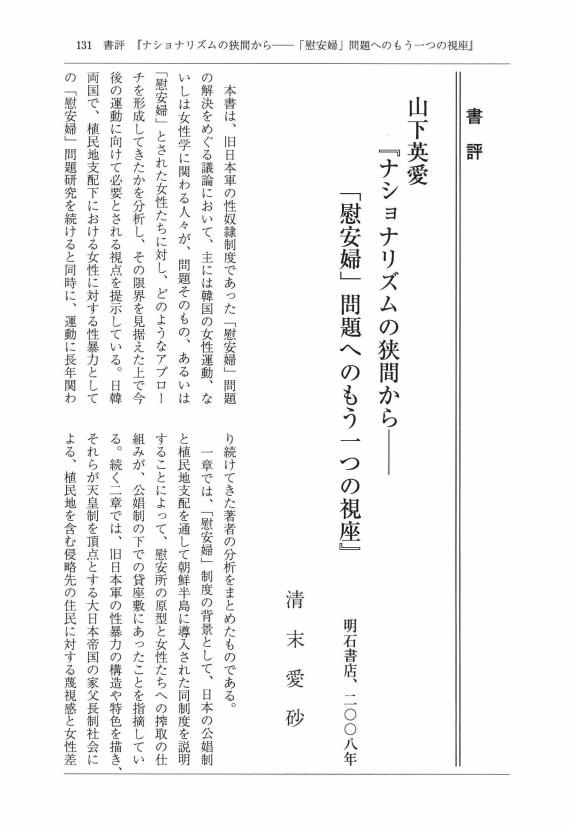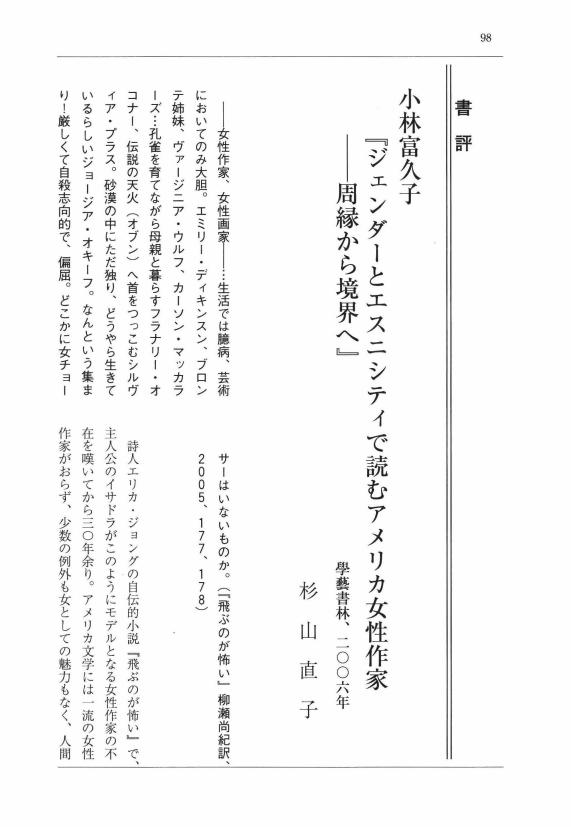4 0 0 0 OA ヘーゲルの自立性再考 ―ケア論の新展開に向けて
- 著者
- 岡崎 佑香
- 出版者
- 日本女性学会
- 雑誌
- 女性学 (ISSN:1343697X)
- 巻号頁・発行日
- vol.23, pp.48-63, 2016-03-31 (Released:2021-11-12)
- 著者
- 松田 和樹
- 出版者
- 日本女性学会
- 雑誌
- 女性学 (ISSN:1343697X)
- 巻号頁・発行日
- vol.26, pp.52-69, 2019-03-31 (Released:2021-11-12)
4 0 0 0 OA 「清き誌上でご交際を」 ―明治末期少女雑誌投書欄に見る読者共同体の研究
- 著者
- 佐藤(佐久間) りか
- 出版者
- 日本女性学会
- 雑誌
- 女性学 (ISSN:1343697X)
- 巻号頁・発行日
- vol.4, pp.114-141, 1996-12-10 (Released:2022-01-17)
4 0 0 0 OA 佐藤文香・伊藤るり編『ジェンダー研究を継承する』 (人文書院 2017年)
- 著者
- 堀川 修平
- 出版者
- 日本女性学会
- 雑誌
- 女性学 (ISSN:1343697X)
- 巻号頁・発行日
- vol.26, pp.88-91, 2019-03-31 (Released:2021-11-12)
3 0 0 0 OA あなたには居場所がある ―イスラエルのLGBT運動における国家言説とシオニズムとの関係
- 著者
- 保井 啓志
- 出版者
- 日本女性学会
- 雑誌
- 女性学 (ISSN:1343697X)
- 巻号頁・発行日
- vol.28, pp.56-78, 2021-03-31 (Released:2022-04-01)
- 参考文献数
- 42
This article examines how demands for the rights of sexual/gender minorities (LGBT) in Israel resonates within discourses on Zionism and Jewish national identity. In recent years, studies on the movement for LGBT rights in Israel have almost exclusively been written from the perspective of Jasbir Puar’s concept of “homonationalism.” Yet these studies have paid little attention to the relationship of local Israeli nationalism, i.e., Zionism, and its connection to homonationalism. This article analyzes the following two examples to demonstrate how right-wing discourses within the LGBT movement, whose presence in the movement has grown significantly in recent years. These are not only associated with the recent homonationalist framework but also Zionism and Jewish national identity. The first example reveals how the pink triangle located outside the LGBT center in Tel Aviv plays an important role in a discourse seeking to emphasize the connection between homosexual persecution and Jewish victimhood during the show’s (Holocaust) and highlights efforts to reclaim the subjectivity of the Jewish nation. The second example is a placard reading, “You Have a Home,” a phrase originated by Likud Pride, the LGBT organization within Likud. This placard was often raised by members of Likud Pride as they walked in one of Israel’s Pride Marches. This slogan intersects and recalls the colonialist discourse on the establishment of a Zionist Jewish home. These examples indicate that the demand for LGBT rights was co-opted by Israel’s right-wing, as revealed by not only their homonationalist discourses relative to the war on terror, but also in the homonationalist discourses which align with the Zionist colonial discourse that seeks to: 1) rehabilitate and reform the image of the Jewish male citizenry, 2) establish Jewish heteronormative homes and 3) create a secular nation whose citizens enjoy the protection of western human rights.
3 0 0 0 OA 学校文化・男性性・近代化 ―「男はつらいよ」から「男もつらいよ」へ―
- 著者
- すぎむら なおみ
- 出版者
- 日本女性学会
- 雑誌
- 女性学 (ISSN:1343697X)
- 巻号頁・発行日
- vol.27, pp.24-34, 2020-04-15 (Released:2021-10-22)
- 参考文献数
- 14
Control-oriented education is characterized as authoritarianism and groupism, which excludes individuality and makes both teachers and students feel suffocated. However, those in power cling to their vested interests, making scapegoats and claiming that men are sufferers, thereby maintaining the status quo. However, if teachers intend to support students under challenging conditions, having actual dialogues concerning the fact that men suffer as well is necessary for all concerned. In this essay, the author discusses the necessity of escaping from masculinity using case studies on high schools that have shifted from control-oriented education and presents concrete remedies to solve such problem.
3 0 0 0 OA 女の体のしくみを、女以上に知っているかのように語る男たち
- 著者
- 田房 永子
- 出版者
- 日本女性学会
- 雑誌
- 女性学 (ISSN:1343697X)
- 巻号頁・発行日
- vol.27, pp.36-40, 2020-04-15 (Released:2021-10-22)
Some websites for men advise men in their 50s to approach women in their 20s to 30s. These texts encourage older men, claiming that they are desirable targets for young women's romantic dates. This type of message, also seen in men's magazines, is now widespread, while in reality, women see it as one of the contributors to the pervasiveness of sexual harassment. Those male writings describe “women's characteristics” solely from their notably unique perspective and judgments. As its example, an author of Theory on Love, a male university professor, writes that men should know women's menstrual cycles because of their preference for men changes before and after their period. He also gives very questionable advice that men should not care if menstruating women reject them because they are too concerned with their blood scent or sanitary items. It is not so strange that this type of message is embraced by those men who learned about women only from adult magazines or porno, having no interaction with real women during their adolescence. Thus some men talk and write about women's bodies more confidently than women do, and many more men blindly absorb these opinions, not taking into account any women's own perspective. How stubborn men are in their refusal to know the reality!
3 0 0 0 OA ポルノグラフィの象徴人類学 ―男の、男による、男のための儀礼の分析―
- 著者
- 沼崎 一郎
- 出版者
- 日本女性学会
- 雑誌
- 女性学 (ISSN:1343697X)
- 巻号頁・発行日
- vol.10, pp.30-46, 2003-01-20 (Released:2021-12-17)
3 0 0 0 OA フェミニズムとアカデミズムの不幸な結婚
- 著者
- 菊地 夏野
- 出版者
- 日本女性学会
- 雑誌
- 女性学 (ISSN:1343697X)
- 巻号頁・発行日
- vol.12, pp.34-46, 2005-03-31 (Released:2021-12-09)
- 著者
- 佐々木 裕子
- 出版者
- 日本女性学会
- 雑誌
- 女性学 (ISSN:1343697X)
- 巻号頁・発行日
- vol.28, pp.34-55, 2021-03-31 (Released:2022-04-01)
- 参考文献数
- 26
Raichō Hiratsuka eloquently wrote of her passionate affection for Kōkichi (Kazue) Otake in “Marumado yori: Chigasaki e Chigasaki e (Zatsuroku)” (From the round window: To Chigasaki, to Chigasaki (A miscellaneous note)), an essay published in Seitō (Bluestocking), the first journal written, edited, and published by women in Japan, in August 1912. Scholars and biographers have taken up Raichō’s works in the following years in which she imputes their affair to Kōkichi through identifying her as a sexual invert by referring to the knowledge of sexology and argued that this attitude shift attests to her conversion from a same-sex or (proto-)lesbian relationship to a heterosexual one after meeting with her lifelong male partner Hiroshi Okumura in the same summer. This paper instead investigates their bodily affective eroticism in “Chigasaki e Chigasaki e,” focusing especially on the scene in which Raichō intently looks at Kōkishi’s self-inflicted wound, which Kōkichi allegedly slashed out of her love for Raichō, and Raichō’s visceral reaction to it. Their bodily affective relationship, however, is subject to a transformation after Kōkichi receives a diagnosis of tuberculosis and admits herself to Nanko-in, a sanatorium in Chigasaki, following Raichō’s recommendation. Raichō’s later turnaround can be reformulated as an attempt to deal with the loss of her superior position and access to Kōkichi’s body, which is now given over to Western medicine. Her approach to sexology is based not only on her intention to comprehend their experience in terms of scientific knowledge but also her continued desire to dominate Kōkichi and her body.
- 著者
- 石島 亜由美
- 出版者
- 日本女性学会
- 雑誌
- 女性学 (ISSN:1343697X)
- 巻号頁・発行日
- vol.25, pp.63-81, 2018-03-31 (Released:2021-11-12)
- 著者
- 井上 輝子
- 出版者
- 日本女性学会
- 雑誌
- 女性学 (ISSN:1343697X)
- 巻号頁・発行日
- vol.24, pp.112-115, 2017-03-31 (Released:2021-11-12)
2 0 0 0 OA ポストフェミニズムから99%のためのフェミニズムへ
- 著者
- 菊地 夏野
- 出版者
- 日本女性学会
- 雑誌
- 女性学 (ISSN:1343697X)
- 巻号頁・発行日
- vol.29, pp.12-22, 2022-03-31 (Released:2023-04-01)
- 参考文献数
- 11
本論は、ポストフェミニズム論がどのようなものなのか概略を示し、日本の文脈で読解することを目指した。まず英米のポストフェミニズム論の概要を整理し、加えてネオリベラル・フェミニズム概念を紹介した。次に、ポストフェミニズム論でいう「ネオリベラル・ジェンダー秩序」を日本の政治経済において具体的に考察した。さらに、ポストフェミニズムの状況が変化し、「新しいフェミニズム」と言われている社会現象を分析した。最後に、そのようなポストフェミニズム状況を変革し乗り越えるために求められる視座を「99%のためのフェミニズム」を例として構想した。
2 0 0 0 OA フランスにおける男性運動および男性性研究の動向
- 著者
- 海妻 径子
- 出版者
- 日本女性学会
- 雑誌
- 女性学 (ISSN:1343697X)
- 巻号頁・発行日
- vol.25, pp.104-115, 2018-03-31 (Released:2021-11-12)
2 0 0 0 OA 日本キリスト教婦人矯風会と五銭袋運動 ―一九一〇年代後半の廃娼運動資金募集活動を中心に―
- 著者
- 楊 善英
- 出版者
- 日本女性学会
- 雑誌
- 女性学 (ISSN:1343697X)
- 巻号頁・発行日
- vol.12, pp.78-89, 2005-03-31 (Released:2021-12-09)
- 著者
- 清末 愛砂
- 出版者
- 日本女性学会
- 雑誌
- 女性学 (ISSN:1343697X)
- 巻号頁・発行日
- vol.16, pp.131-135, 2009-03-31 (Released:2021-12-05)
- 著者
- 近藤 凜太朗
- 出版者
- 日本女性学会
- 雑誌
- 女性学 (ISSN:1343697X)
- 巻号頁・発行日
- vol.28, pp.102-106, 2021-03-31 (Released:2022-04-01)
- 著者
- 杉山 直子
- 出版者
- 日本女性学会
- 雑誌
- 女性学 (ISSN:1343697X)
- 巻号頁・発行日
- vol.14, pp.98-102, 2007-04-09 (Released:2021-12-09)
- 著者
- 千田 有紀
- 出版者
- 日本女性学会
- 雑誌
- 女性学 (ISSN:1343697X)
- 巻号頁・発行日
- vol.25, pp.33-42, 2018-03-31 (Released:2021-11-12)
1 0 0 0 OA 『青鞜』におけるレズビアニズムの再考 ―掲載小説を手掛かりにして―
- 著者
- 趙 書心
- 出版者
- 日本女性学会
- 雑誌
- 女性学 (ISSN:1343697X)
- 巻号頁・発行日
- vol.29, pp.54-75, 2022-03-31 (Released:2023-04-01)
- 参考文献数
- 23
女性運動の先駆として有名な『青鞜』(1911年創刊) の研究において、「レズビアニズムの排除」が指摘されてきた。しかし、それが平塚らいてうが執筆した評論的な文章のみを分析して得られた結論であり、文学的な作品におけるレズビアン表象については検討されていない。本論では、『青鞜』における四つのレズビアン小説を、同時代の女性同性愛言説との関係性において読むことで、「レズビアニズムの排除」という理解を修正することを試みた。1913年前後〈新しい女〉の社会問題化をきっかけに、『青鞜』の女性解放論者の周りで女性同性愛をめぐる言説が多く浮かび上がってきた。『青鞜』の小説が、外部の同性愛言説に応答しながら、レズビアニズムに対する意味づけを更新していた。そこには「レズビアニズムの排除」に収まらない言語表現が確認できる。女性同性愛を揶揄するスキャンダルな言説に対し、小説はそれに対抗しまたはそれを攪乱している。さらに『青鞜』が性科学を用いてレズビアニズムを排除した以後も、小説には同性愛に承認を与え、排除に抵抗する言説が現れている。小説というジャンルには、従来見落とされてきた、『青鞜』におけるレズビアニズムの一つの水脈が見出せる。













